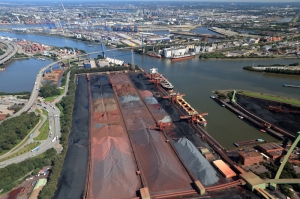


(Posted on 18/05/20)
Seaborne cargo throughput for Q1 in the Port of Hamburg, which remains fully operational, was 7.9 percent lower this year with bulk cargoes 11.9 percent lower.
Even Germany’s largest universal port is affected by the repercussions of the corona crisis. Seaborne cargo throughput in the first quarter of the year at 31.9 million tons was 7.9 percent down on 2019. First-quarter throughput of bulk cargoes was 11.9 percent lower at 9.4 million tons. In this throughput segment, exports performed well, being 11.9 percent higher at 2.7 million tons. The trend was sustained by notable increases in exports of grain, up 177.2 percent at 694,000 tons, and of fertilizers, 8.1 percent higher at 638,000 tons. Container handling at 2.2 million TEU was 6.6 percent lower. Container hinterland transport services remains comparatively stable, while the drop in demand for transhipment handling was more obvious.
In the difficult economic conditions caused by the worldwide corona crisis, the port performs an essential function in maintaining reliable supplies of products and raw materials for the economy and the population. The slackening of import and export flows apparent in Germany’s largest universal port can be explained by the interruption to transport and supply chains caused by the impact of the corona crisis. “The partial shutdown of the Chinese economy, resulting in blank sailings in shipping, has led to lower cargo handling in Hamburg as well,” explained Axel Mattern, Joint CEO of Port of Hamburg Marketing.
Mattern pointed out that the port with its high-performance cargo handling terminals and inland transport services remains fully operational. He expressed thanks for their dedication at a difficult time to the port’s up to 156,000 directly and indirectly employed staff and the companies in the seaport business, who all ensure smooth cargo handling, day in, day out. “We assume that with its large workforce and well-established enterprises, the Port of Hamburg will successfully surmount this crisis,” said Mattern.
Among the Port of Hamburg’s most important partner countries by volume on seaborne container traffic, first-quarter trends varied a great deal. At 579,400 TEU, the total number of containers handled during the first quarter in the Port of Hamburg for China, its most important trading partner, was 14.6 percent lower. “The downturn in seaborne cargo throughput with China is explicable in connection with the repercussions of the corona crisis,” said Mattern.
“In recent weeks the Port of Hamburg’s superb hinterland connection has played a major part in ensuring that even in difficult times its effectiveness has remained unimpaired,” said Jens Meier, CEO of HPA. “Despite temporarily lower container volumes caused by the corona crisis, in the first quarter the Port Railway was able to report stable utilization and indeed even to improve on the 2018 level. That was by no means to be taken for granted, but is the result of systematically boosting efficiency and continuously expanding the Hamburg Port Railway.”
For the next few months, Axel Mattern assumes that the Port of Hamburg must initially adapt to a continuation of blank sailings and falling total throughput. “From June, it is entirely possible that with a gradual pick-up in the economy in China and Europe, we shall be seeing an increase in sailings and rising volumes on port throughput and seaport-hinterland services,” asserted a confident Mattern.
Abu Dhabi based AD Ports Group, a global enabler of integrated trade, transport, industry, and logistics... Read more
This year marks a significant milestone in maritime innovation as Port Hedland, Australia, celebrates... Read more
Associated British Ports (ABP), the UK’s leading port operator, has announced the latest tranche... Read more
During the Investment, Labour, and Trade Promotion Programme in Japan (November 16–22, 2025),... Read more
AD Ports Group subsidiary Khalifa Economic Zones Abu Dhabi - KEZAD Group, the largest operator of integrated... Read more
Abu Dhabi based AD Ports Group, a global enabler of integrated trade, transport, industry, and logistics... Read more
Peel Ports Group has achieved a 48% reduction in operational greenhouse gas emissions in the last five... Read more
The Trois-Rivières Port Authority (TRPA) in Canada has announced the appointment of Mr. Anick... Read more
Euroports commitment to continuously improving operational efficiency, enhancing workplace safety, and... Read more
Under the slogan ‘Your Intermodal Link Between China, Iberia and the Atlantic Markets,’... Read more